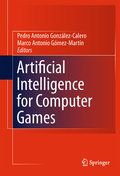
The book presents some of the most relevant results from academia in the areaof Artificial Intelligence for games. It emphasizes well theoretically supported work supported by developed prototypes, which should lead into integrationof. academic AI techniques into current electronic entertainment games. The book elaborates on the main results produced in Academia within the last 10 years regarding all aspects of Artificial Intelligence for games, including pathfinding, decision making, and learning. A general theme of the book is the. coverage of techniques for facilitating the construction of flexible not prescripted AI for agents in games. Regarding pathfinding, the book includes new techniques for implementing real-time search methods that improve the results obtained through AI, as well as techniques for learning pathfinding behavior by observing actual players. Regarding decision making, the book describes new techniques for authoring tools that facilitate the construction by game designers (typically nonprogrammers) of behavior controlling software, by reusing patterns or actual. cases of past behavior. Additionally, the book will cover a number of approaches proposed for extending the essentially pre-scripted nature of current commercial videogames AI into a more interactive form of narrative, where the story emerges from the interaction with the player. Some of those approaches. rely on a layered architecture for the character AI, including beliefs, intentions and emotions, taking ideas from research on agent systems. The book also includes chapters on techniques for automatically or semiautomaticallylearning complex behavior from recorded traces of human or automatic players using different combinations of reinforcement learning, case-based reasoning, neural networks and genetic algorithms. Translates the last decades of research into practical ideas to enhance the computer game experience; Presents approaches for evolving interaction beyond the pre-scripted narratives normally encountered; Integrates research into reinforced learning, case-based reasoning and genetic algorithms into game development INDICE: Visual Data Mining of Player Traces in Interactive Environments. Heuristic search methods for pathfinding. Pattern-based AI Scripting. Case-Based Reasoning and User-Generated Gameplay. Knowledge acquisition for adaptive. game AI. Game AI as Storytelling. Affective Interactive Narrative. Virtual Humans. Interactive Drama. Dynamic Behaviour Trees.
- ISBN: 978-1-4419-8187-5
- Editorial: Springer New York
- Encuadernacion: Cartoné
- Páginas: 300
- Fecha Publicación: 10/05/2011
- Nº Volúmenes: 1
- Idioma: Inglés
